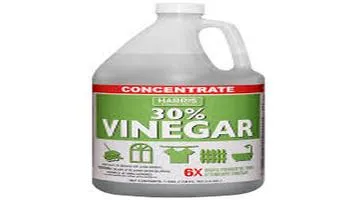A Comprehensive Review of White Vinegar: The Unsung Hero of Household Essentials
White vinegar, also known as distilled vinegar, is a versatile household staple renowned for its sharp, tangy flavor and powerful cleaning properties. Composed primarily of acetic acid and water, it typically contains around 4-7% acetic acid by volume. This clear, colorless liquid is produced through the fermentation of grain alcohol, which is then distilled to reach the desired acidity. In the culinary world, white vinegar is often used for pickling, as a marinade, or to add a subtle zest to sauces and dressings. Beyond the kitchen, it is celebrated for its eco-friendly cleaning capabilities, effectively removing stains, odors, and grime. Its disinfectant properties make it a popular choice for natural cleaning solutions, while its affordability and availability add to its widespread appeal.

White vinegar is a staple found in almost every household, yet it often doesn’t receive the recognition it deserves. This humble liquid, derived from the fermentation of ethanol, offers a myriad of uses that extend far beyond the kitchen. From culinary applications to cleaning, gardening, and even personal care, white vinegar is a versatile and economical solution to many of life's everyday challenges. In this review, we will explore the various facets of white vinegar, shedding light on its versatility, effectiveness, and benefits.
Culinary Uses
White vinegar's most common use is in the culinary world. It serves as an essential ingredient in a variety of recipes, particularly in pickling. Its sharp, tangy flavor enhances the taste of preserved vegetables and fruits, giving them a distinctive zing that is both refreshing and appetizing. Additionally, white vinegar is indispensable in the preparation of marinades, salad dressings, and sauces. Its acidity helps to tenderize meat, making it a key component in many barbecue and grilling recipes.
On the baking front, white vinegar can act as a leavening agent when combined with baking soda. This reaction produces carbon dioxide, which helps baked goods rise, resulting in fluffier cakes and cookies. Moreover, a splash of white vinegar can stabilize egg whites, making them easier to whip into stiff peaks for meringues and soufflés.
Cleaning Powerhouse
One of the most celebrated uses of white vinegar is its cleaning prowess. Its acidic nature makes it an excellent natural cleaner, capable of tackling a wide range of household chores. White vinegar can effectively remove grease, grime, and mineral deposits, making it ideal for cleaning kitchen surfaces, appliances, and bathroom fixtures. A mixture of white vinegar and water can clean windows and mirrors to a streak-free shine, while its deodorizing properties help eliminate unpleasant odors from rooms, fabrics, and even shoes.
White vinegar is also an eco-friendly alternative to many commercial cleaning products, which often contain harsh chemicals. Its versatility extends to laundry care, where it can be used as a fabric softener, static reducer, and stain remover. By adding a cup of white vinegar to the rinse cycle, you can ensure that your clothes come out soft and free of detergent residue.
Gardening Aid
Gardeners will find white vinegar to be an invaluable tool in their arsenal. It serves as a natural herbicide, effectively eliminating weeds from driveways, sidewalks, and garden paths. Simply spray undiluted white vinegar on the unwanted plants, and they will wither away within a few days. Additionally, white vinegar can help adjust the pH level of soil, making it more acidic. This is particularly beneficial for acid-loving plants like azaleas, rhododendrons, and blueberries.
Personal Care
White vinegar's benefits extend into the realm of personal care as well. It can be used as a natural remedy for various skin and hair concerns. A diluted solution of white vinegar and water makes an excellent toner, helping to balance the skin's pH levels and reduce acne. For those suffering from dandruff, a white vinegar rinse can help alleviate flakiness and itchiness by restoring the scalp's natural acidity.
Moreover, white vinegar can be used as a natural deodorant, foot soak, and even a teeth whitener. Its antimicrobial properties make it effective at killing bacteria, reducing body odor, and promoting overall oral hygiene.
Cost-Effective and Eco-Friendly
One of the most significant advantages of white vinegar is its cost-effectiveness. A large bottle of white vinegar is relatively inexpensive, yet it offers countless uses that can replace multiple specialized products. This not only saves money but also reduces clutter and waste, as you no longer need to buy and store a plethora of cleaning agents, fabric softeners, or personal care items.
Furthermore, white vinegar is environmentally friendly. It is biodegradable and non-toxic, making it a safer option for households with children and pets. By choosing white vinegar over chemical-laden products, you can contribute to a healthier home and planet.
Potential Drawbacks
While white vinegar offers numerous benefits, it is not without its limitations. Its strong odor can be off-putting to some, although this usually dissipates quickly after use. Additionally, its high acidity can damage certain surfaces, such as natural stone, hardwood floors, and some fabrics. It is essential to test white vinegar on a small, inconspicuous area before using it extensively.
Conclusion
White vinegar is a versatile, economical, and eco-friendly solution that deserves a place in every household. Its wide range of applications, from culinary uses to cleaning, gardening, and personal care, make it an invaluable asset. While it may not be the most glamorous product, its effectiveness and cost-saving benefits cannot be overstated. Whether you are looking to enhance your cooking, maintain a clean home, or adopt a more sustainable lifestyle, white vinegar is the unsung hero that can help you achieve your goals.






